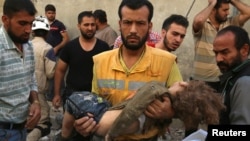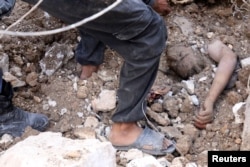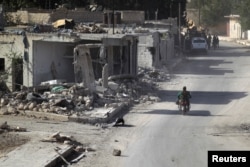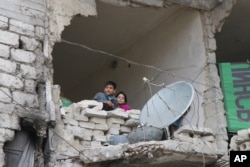The United Nations' top human rights official has called for limits on the use of the veto power by the U.N. Security Council's five permanent members to halt the tragedy unfolding in east Aleppo in northern Syria.
U.N. High Commissioner for Human Rights Zeid Ra'ad al Hussein has called the situation nothing short of calamitous and likened the horrors being inflicted on the citizens of Aleppo to those that occurred in cities such as Warsaw, Stalingrad and Dresden in World War II.
"We cannot afford to fail Aleppo," Zeid said. "We cannot afford to continue to fail the thousands of children trapped in this city awaiting their slaughter."
The United Nations and human rights organizations have been frustrated by the inability of the U.N. Security Council to act against such atrocities.
Russia, often backed by China, has used its veto power in the Security Council to block resolutions it deemed unfavorable to its ally, Syrian President Bashar al-Assad. The high commissioner's spokesman, Rupert Colville, said Zeid was calling for bold leadership to end this practice.
"The U.N. Security Council, in particular, should without any further delay, adopt criteria to restrain members from using the veto when there are serious concerns [that] war crimes, crimes against humanity or genocide may have been committed."
Question of war crimes
Over the past week and a half, inhabitants of rebel-controlled east Aleppo have endured the most intense attacks since Syria's civil war began more than five years ago, with not a single neighborhood considered safe.
Commissioner Zeid has condemned the reported use of weapons such as high-explosive blast bombs and incendiary devices by government forces and Russia in heavily populated areas. He said they were "having a devastating impact on the civilian population and structures."
Zeid also criticized armed opposition groups for using so-called hell cannons — improvised rockets fitted with gas canisters — saying they are virtually impossible to aim correctly "and have frequently killed and maimed civilians in government-held areas" of Aleppo.
The World Health Organization (WHO) reports that 342 people have been killed — nearly a third of them being children — and more than 1,100 people have been wounded — 261 of them children — in the past two weeks.
"These numbers represent only those reported from functioning health facilities," said WHO spokeswoman Fadela Chaib. "The actual figures are expected to be higher."
In addition to the casualties, Chaib told VOA that two of Aleppo's eight partially functioning hospitals have been repeatedly attacked, and only six are in service. She said only one hospital offers trauma care services.
She said fewer than 30 doctors remain in Aleppo to treat a population of 270,000, and "they are working seven days a week under very stressful conditions with the fear of being attacked while they are doing their job."
Reacting to this situation, Colville told VOA the bombing of medical facilities could be a war crime if proven to be intentional.
"The sheer number of hits on these medical facilities in Aleppo really raises the question of war crimes or even crimes against humanity," he said.
He said an initiative, which was pioneered by the French government, would "permit the Security Council to refer the situation in Syria to the International Criminal Court."
"Such a referral, he said, "would be more than justified given the rampant and shocking impunity enjoyed by those guilty of terrible crimes throughout this conflict."
Political settlement in doubt
"It's not [Zeid's] responsibility to discuss veto powers," Russia's U.N. ambassador, Vitaly Churkin, said when asked about the high commissioner's remarks. "Unfortunately, my good friend has been overstepping the limits of his responsibilities quite a bit, and this is unfortunate."
Before becoming high commissioner for human rights, Prince Zeid was Jordan's U.N. ambassador and sat on the Security Council for part of a two-year term.
The United States has broken off talks with Russia, accusing it of failing to implement a cessation of hostilities agreement they had concluded Sept. 9. This has cast additional doubt on the ability of the United Nations to mediate a political settlement to the Syrian conflict, which has killed more than 250,000 people and displaced more than 11 million.
Jessy Chahine, spokeswoman for the Office of the Special Envoy for Syria, said Staffan de Mistura deeply regretted the "suspension of the American-Russian diplomatic cooperation on the cessation of hostilities in Syria."
She noted de Mistura vowed that the U.N. would continue to push for a political solution of the Syrian conflict "regardless of the very disappointing outcome of intense and long discussions among two crucial international stakeholders."















